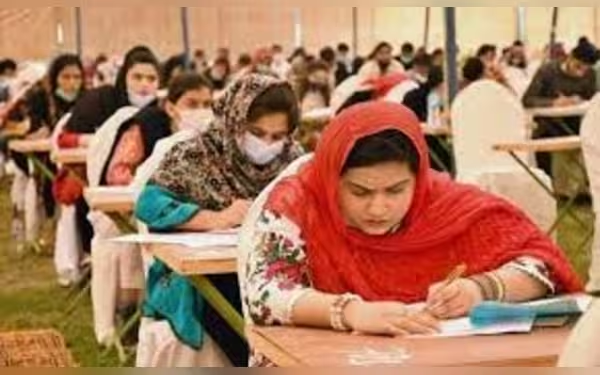Sunday, December 22, 2024 06:12 PM
PMDC Introduces E-Assessment System for MDCAT 2024
- PMDC plans e-assessment for MDCAT next year.
- 167,772 candidates registered for 2024 MDCAT.
- Unified syllabus and technology integration emphasized.
 Image Credits: dawn
Image Credits: dawnPMDC plans to implement an e-assessment system for MDCAT 2024, enhancing exam integrity and efficiency for over 167,000 candidates.
In a significant move towards modernizing the Medical and Dental College Admission Test (MDCAT), the Pakistan Medical and Dental Council (PMDC) is contemplating the introduction of an e-assessment system starting next year. This initiative aims to enhance the examination process, ensuring it is both efficient and secure. The PMDC is committed to maintaining a center-based examination format, similar to previous years, while leveraging technology to improve the overall experience for candidates.
The PMDC has recently formed a seven-member committee tasked with reforming the MDCAT. This committee, which includes representatives from all provinces, is focused on addressing various challenges associated with the examination. Their goals include ensuring transparency, minimizing errors, and implementing IT-based solutions. One of the key considerations is to schedule the MDCAT immediately after intermediate exams, a strategy aimed at reducing the influence of tuition mafias that often exploit students.
During the inaugural meeting of the MDCAT Reform Committee held in Islamabad, it was revealed that a total of 167,772 candidates have registered for the 2024 exam, which will take place not only in Pakistan but also in Dubai and Saudi Arabia. The committee discussed the performance of various examining universities, sharing insights on overall percentages and the highest scores achieved. Furthermore, updates were provided regarding the retake of exams for two universities in Sindh and the federal capital, following directives from the Sindh High Court and Islamabad High Court due to allegations of malpractices.
Clearing the MDCAT is essential for students aspiring to gain admission to medical and dental colleges across the country. The chairman of the committee, Prof Dr Suhail Amin, underscored the necessity of implementing a unified syllabus for this high-stakes examination. He emphasized the importance of incorporating technology to enhance the quality of the exams, urging the committee to devise effective mechanisms to tackle existing issues.
In a related development, the Inter-Boards Coordination Commission (IBCC) Chairman announced the completion of the "Examination Bible," a comprehensive guide for grades 9-12 that outlines exam procedures and question bank development. This guide is set to be implemented nationwide, and the chairman expressed his support for e-examinations for the MDCAT, highlighting their practicality for multiple-choice questions (MCQs).
The committee also reviewed the current status of the syllabus and question bank, noting that developing an e-assessment system is feasible in today’s technological landscape. They deliberated on the global trend of entry tests designed to assess candidates' potential as health professionals, deciding to incorporate content that evaluates higher cognitive abilities, critical thinking, and ethical considerations.
Prof Dr Rizwan Taj, the President of PMDC, endorsed the committee's discussions and highlighted the need for an Action Plan for MDCAT reforms to be submitted by December 2024. He expressed concern over the recent misconduct during the MDCAT exam, stating, "We are deeply concerned about the harm caused by unscrupulous elements who have tarnished the image of the entire system in this national exercise."
To streamline the reform process, the chairman established three sub-committees with specific tasks and deadlines. The first sub-committee will focus on drafting a unified syllabus, while the second will propose a secure question bank portal and e-assessment plan. The third sub-committee will work on developing a comprehensive policy document for the smooth implementation of the national exam.
As the PMDC moves forward with these reforms, it is clear that the future of the MDCAT is set to embrace technology while ensuring fairness and transparency. This initiative not only aims to improve the examination process but also seeks to restore the integrity of the system, ultimately benefiting students across the nation. The commitment to reform is a positive step towards a more equitable and efficient educational landscape in Pakistan.













